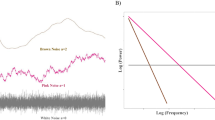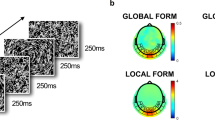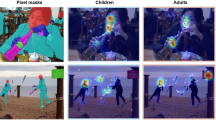Abstract
LITTLE is known about how visual attention of the mother–infant pair is directed jointly to objects and events in the visual surround during the first year of the child's life. To what extent does the child follow the mother's lead and the mother the child's, and what are the processes involved? The ability of the infant to respond successfully to such signals allows the mother to isolate and highlight a much wider range of environmental features than if the infant ignores her attention-directing efforts. We report a preliminary investigation of the extent of the infant's ability to follow changes in adult gaze direction during the first year of life.
This is a preview of subscription content, access via your institution
Access options
Subscribe to this journal
Receive 51 print issues and online access
$199.00 per year
only $3.90 per issue
Buy this article
- Purchase on Springer Link
- Instant access to full article PDF
Prices may be subject to local taxes which are calculated during checkout
Similar content being viewed by others
References
Flavell, J. H., The Developmental Psychology of Jean Piaget (Van Nostrand Reinhold, New York, 1963).
Schaffer, H. R., Bull. Br. Psychol. Soc., 27, 209 (1974).
Author information
Authors and Affiliations
Rights and permissions
About this article
Cite this article
SCAIFE, M., BRUNER, J. The capacity for joint visual attention in the infant. Nature 253, 265–266 (1975). https://doi.org/10.1038/253265a0
Received:
Revised:
Issue Date:
DOI: https://doi.org/10.1038/253265a0
This article is cited by
-
Differential responses to con- and allospecific visual cues in juvenile ravens (Corvus corax): the ontogeny of gaze following and social predictions
Animal Cognition (2023)
-
Visualizing a Task Performer’s Gaze to Foster Observers’ Performance and Learning—a Systematic Literature Review on Eye Movement Modeling Examples
Educational Psychology Review (2023)
-
What We Do and Don’t Know About Joint Attention
Topoi (2023)
-
Canine perspective-taking
Animal Cognition (2023)
-
Infant selective attention to native and non-native audiovisual speech
Scientific Reports (2022)
Comments
By submitting a comment you agree to abide by our Terms and Community Guidelines. If you find something abusive or that does not comply with our terms or guidelines please flag it as inappropriate.



